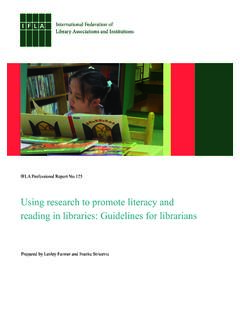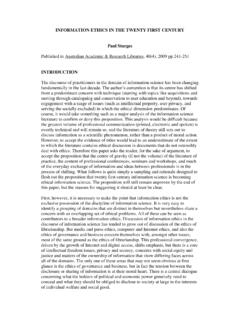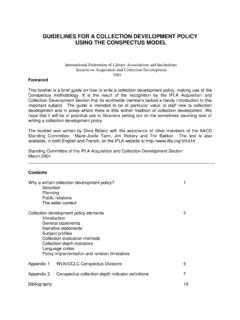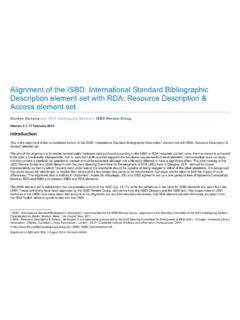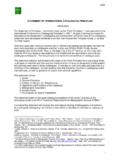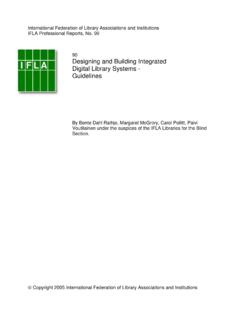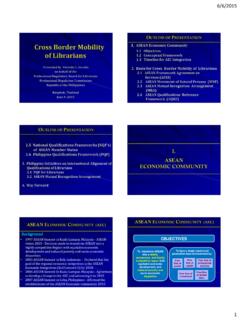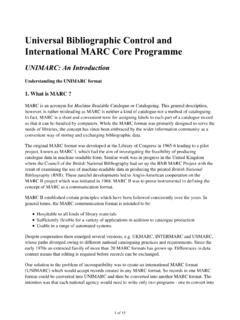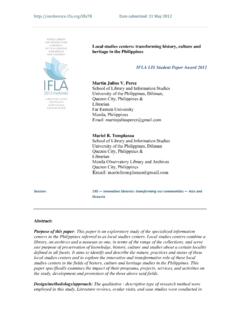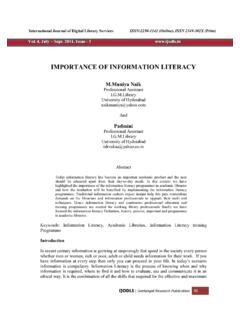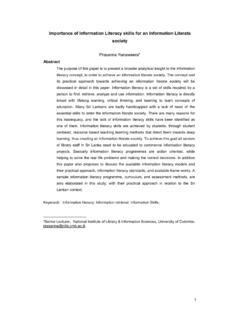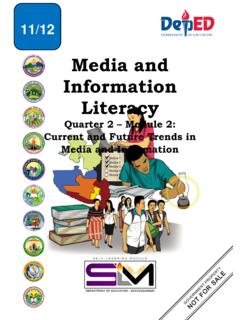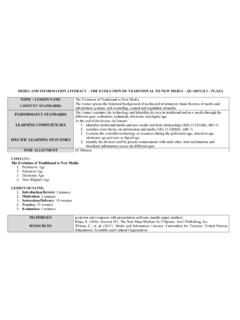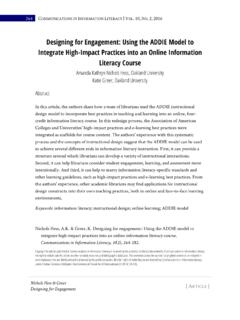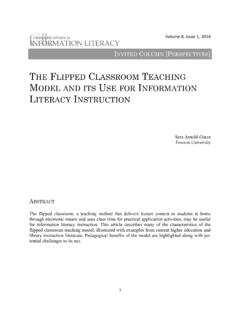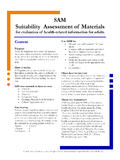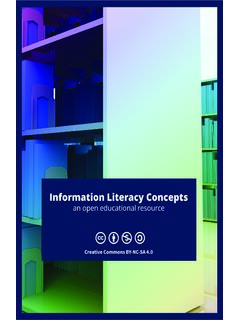Transcription of GUIDELINES ON INFORMATION LITERACY FOR LIFELONG …
1 GUIDELINES ON. INFORMATION LITERACY FOR. LIFELONG LEARNING*. Final draft By Jes s Lau Chair, INFORMATION LITERACY Section / IFLA. / Universidad Veracruzana / DGB / USBI VER. Boca del R o, Veracruz, M xico Reviwed July 39, 2006. Abstract The International GUIDELINES on INFORMATION LITERACY have been compiled by the INFORMATION LITERACY Section (InfoLit) of the International Federation of Library Associations and Institutions (IFLA) with the aim of providing a pragmatic framework for those professionals who need or are interested in starting an INFORMATION LITERACY program. The GUIDELINES will aid INFORMATION professionals engaged in educational programs, , basic and higher education, in their efforts to meet their current INFORMATION needs. However, most of the concepts, principles and procedures can be applied with minimal adaptation to any library setting.
2 INFORMATION professionals working in all types of libraries should have as one of their main institutional goals the facilitation of users' efforts to acquire INFORMATION competencies. INFORMATION skills are vital to the success of LIFELONG learning, employment, and daily interpersonal communication of any citizen, such as when a person needs INFORMATION about health services for someone in his/her care, or a student requires specific INFORMATION to complete an assessment. *Please see the acknowledgements section. Carol Elliott (USA) contributed the editing of the document 2. Table of Contents Acknowledgments 3. Introduction .. 4. 1. INFORMATION LITERACY Concepts .. 6. 2. INFORMATION LITERACY and LIFELONG Learning .. 12. 3 International Standards . 16. 4.
3 Institutional Commitment .. 20. 5. Action Plan .. 23. 6. Learning/Instruction Management .. 27. 7. Personnel Development .. 32. 8. Learning Theories .. 35. 9. Learning Assessment .. 42. 10. Glossary . 48. 11. Bibliography .. 51. 12. Index 59. 3. Acknowledgments These GUIDELINES have received public review during the period September, 2004 to March, 2005. The author received comments, suggestions, and complete new paragraphs from different INFORMATION professionals around the world. Every thought submitted was evaluated according to the objectives of the GUIDELINES , excluding only those that were out of the scope of the GUIDELINES or could not be included because of time limitations. Thanks to these contributions the second draft of the GUIDELINES is a more comprehensive document.
4 It is also a clearer reflection of the international INFORMATION LITERACY needs of the library community. The first feedback came from the participants (more than 120), who attended the IFLA Open Discussion Session held in Buenos Aires. A second set of suggestions came from those who contacted me (more than 50) with general suggestions or inquires by email. A third group of enhancements came from those who provided more comprehensive contributions or specific revisions to the GUIDELINES . Their names are included, with special thanks, in the following list ordered according to the estimated input: Jesus Cortes (UACJ/Mexico) provided the first revision to the whole draft document Forest Woody Horton, Jr. (USA) contributed several new paragraphs related to INFORMATION LITERACY and LIFELONG learning Thomas Kirk (USA) provided a detailed revision of the complete document Sylvie Chevillotte (France) revised and enhanced Chapter 3.
5 SCONUL Advisory Committee on INFORMATION LITERACY (Headed by Liz Hart (United Kingdom) provided an invaluable set of recommendations for all of the sections Angela Peragallo and members of Grupo Programa de Educaci n en Informaci n, Universidad de Antofagasta (Chile) partially revised the document and provided some conceptual contributions Geoff Walton (Great Britain) contributed recommendations for all of the sections Berenice Mears (Mexico) provided overall suggestions for the document Viggo Gabriel Borg Pedersen (Norway) sent comments on evaluation and assessment Jayme Spencer, Hildy Benham, and Alison Armstrong (Egypt) offered general comments Olle Rimsten (Sweden) provided some general comments on the document Christina Tovot (Sweden) offered general comments on Chapter 4.)
6 4. Introduction INFORMATION competencies are a key factor in LIFELONG learning. They are the first step in achieving educational goals. The development of such competencies should take place throughout citizens' lives, especially during their educational years, where librarians, as a part of the learning community and, as experts in INFORMATION management, have or should assume the key role of facilitating INFORMATION LITERACY . Through the creation, with faculty, of curriculum-integrated programs, librarians should actively contribute to the students'. learning processes in their search to enhance or develop the skills, knowledge and values needed to become LIFELONG learners. These GUIDELINES are a conceptual template to guide the creation of INFORMATION LITERACY (IL).
7 Programs in academic and school libraries, although most of the principles can also be applied to public libraries. The document provides INFORMATION to frame the IL efforts of educators, librarians and INFORMATION facilitators at the international level, particularly in nations where IL is in the early stages of development. It is also of value to anyone who may need to start an IL program and would like a general conceptual framework, regardless of their geographical location. Funding. The initial funding of the International LITERACY GUIDELINES Project was provided by IFLA, the parent organization of the INFORMATION LITERACY Section. Complementary funding was provided by the Universidad Veracruzana, and from the author responsible for the IL compilation project.
8 The final step of translating and promoting these GUIDELINES was completed with the generous funding of the United Nations Educational, Scientific and Cultural Organization (UNESCO). Compilation. The principles, procedures, recommendations, and concepts listed in the document are a compilation from different international documents related to INFORMATION LITERACY . Most of the content is based on published experiences generated by national library associations, as follows: the extensive work of the Association of College and Research Libraries (ACRL), the seminal and early contributions of the American Association of School Libraries (AASL), the work done by the Big Blue project, the INFORMATION skills problem-solving models of the Big Six expounded by Eisenberg and Berkowitz (1997), all from the United States, the contribution of the Society of College, National, and University Libraries (SCONUL) from the United Kingdom, the Australian and New Zealand Institute for INFORMATION LITERACY and the contributions of the Mexican INFORMATION LITERACY Forum.
9 Use of the GUIDELINES . These INFORMATION LITERACY GUIDELINES can be reviewed, changed or adapted by librarians according to their institutional needs so that IL elements can be better suited to local or national needs where local budget, policies, procedures, and priorities may be different. The only copyright requirement for any of this document is to cite it. The GUIDELINES serve as a checklist during the planning and implementation of an IL program, or to reinforce previous INFORMATION LITERACY work. INFORMATION professionals must keep in 5. mind that they need to do whatever they can with the resources that they may have. It is better to do something than to wait for the crafting of the perfect INFORMATION LITERACY program. Arrangement of GUIDELINES . The document is divided into ten chapters that comprise the organizational spectrum of INFORMATION LITERACY work, including a definition of concepts, a proposal for INFORMATION LITERACY standards, a section on obtaining institutional commitment, the management of the learning process, including personnel development, educational theories, among other basic topics on how to implement the program, plus a list of key IL terms with their definitions, and a bibliography for further reading.
10 In most cases each topic is briefly introduced, followed by paragraphs with lists of bulleted points and a graphic summarizing the processes involved. The writing style is simple and schematic for easy reading. 6. Chapter 1. INFORMATION LITERACY Concepts It is important to know the different concepts1 that are related to INFORMATION LITERACY to identify a clear direction for an INFORMATION LITERACY program. This section contains a brief definition of relevant terms followed by the key concepts of INFORMATION literacy2. What is INFORMATION ? INFORMATION is a resource that has varied definitions according to the format, and media used to package or transfer it, as well as the discipline that defines it. Case (2002) provides a broader definition. Here the term is synonymous with: Encapsulated knowledge Packaged human experience A source that can provide a myriad of data A resource that takes different formats, packaging, transfer media, and varied methods of delivery People: family, friends, tutors, fellow students Institutions, , national health service professionals or help facilities The need for effective use of INFORMATION .
